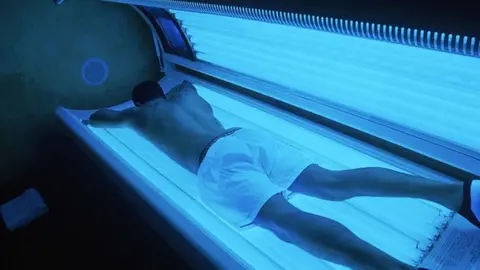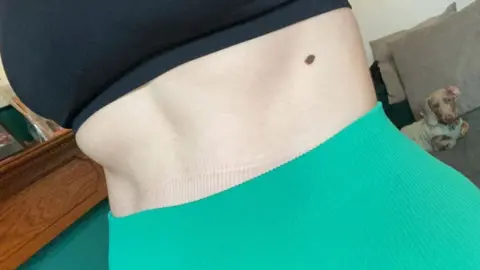Scientists: 'A ban on sunbeds could save lives from skin cancer'
 Getty Images
Getty ImagesScientists in England believe a ban on sunbeds could save lives.
A team from the University of Manchester have been working with scientists in Australia - where sunbeds are already banned.
They looked at the harm and costs linked with indoor tanning.
The research in the British Journal of Dermatology suggests there could be 1,200 fewer cases, and 200 fewer deaths, in the lifetimes of the 18-year-olds they projected the model on.
The researchers applied the same model to England, suggesting it could save the NHS £700,000.
The Sunbed Association says it "utterly refutes" the claims made in the study.
Professor Adele Green, an expert in health and disease from the University of Manchester told Radio 1 Newsbeat: "We tracked the impact a total ban would have on 620,000 18-years-olds in England."
Professor Green says they also wanted to inform people about the risks linked with sunbeds.
"There's a lot of misunderstanding about sunbeds, such as it provides vitamin D and it gives protective tans, I'm afraid both of these are incorrect.
"What sunbed exposure does is bring on premature aging and wrinkling of the skin as well as eye problems and high risks of skin cancer."
'Theoretical claims'
Tanning is big business. The Sunbed Association estimates there are several thousands of tanning salons across the UK.
It denies all claims that sunbeds should be banned in the UK.
"We utterly refute the mathematically theoretical claims made in this study, not least because it relies heavily on data from studies conducted outside of the UK where the sunbed industry is not as well-regulated as it is here," says Gary Lipman, chairman of The Sunbed Association.
"A tanning session in a professional sunbed salon in England uses sunbeds that are designed to comply with a British Standard that dramatically reduces any risk of burning."
'It was the scariest experience of my life'
 Sasha Ridge
Sasha RidgeSasha is 26 and lives in Oxford. She started using tanning salons when she was 18.
"If I was going abroad I would always book sunbeds for a couple of weeks in advance, because I heard that if you did that and had a base tan you wouldn't burn."
Sasha, who's training to be a personal trainer, says she doesn't use tanning salons at all now because of a mole she had on her skin which had to be removed.
She believes it was caused by her sunbed use - but this can't be proven.
It was discovered by her GP by chance.
"Last summer I got bitten by a bug and it wouldn't go away. I went to the GP and when I showed her the GP noticed the mole."
"In a matter of weeks I was being operated on and the mole was being cut out."
 Sasha Ridge
Sasha RidgeShe says the whole experience was "really scary" and she was worried about dying.
There's no way to know if the sunbed caused the mole but Sasha says she doesn't sunbathe or use sunbeds at all now.
Her advice to people who use sunbeds is to "please, please tan from a bottle" and she doesn't want others to go through what she went through.
'There is no safe way to tan'
According to figures from Cancer Research UK, there are around 2,300 melanoma skin cancer deaths in the UK every year.
Susanna Daniels is CEO of Melanoma Focus and says their advice is not to use sunbeds at all.
"There's no such thing as a safe tan, particularly if you've got pale skin or lots of moles we would advise not using them."
"Sunbeds give out greater doses of UV rays than the midday tropical sun and what these UV rays do is damage the DNA in your skin."
Using sunbeds is popular in England especially in the North East.
Melanoma Focus has described the North East as the "sunbed capital of the UK."
The charity surveyed 1000 people in England and found nearly half of adults living in the region have used a sunbed at least once.
It says across England 42% of 18 to 25 year olds are believed to use sunbeds.

